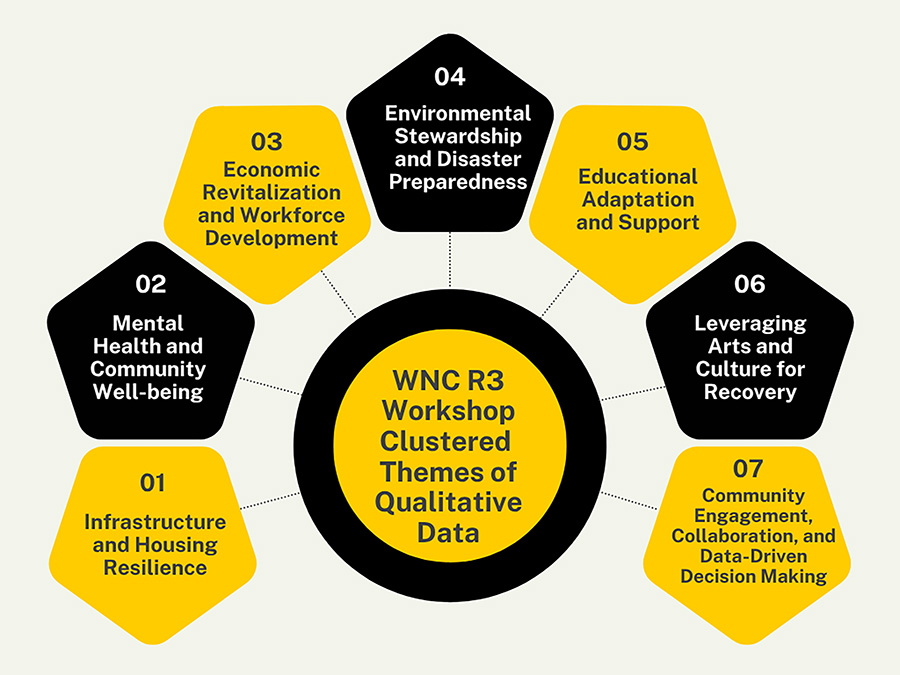
Themed areas identified in the Western North Carolina Research for Recovery and Resilience Workshop represent partnership opportunities and fields where App State research expertise stands to make a positive impact in hurricane recovery and resilience. Image by App State Office of Research and Innovation
BOONE, N.C. — Hurricane Helene’s cascading effects swept through Western North Carolina’s communities, landscapes and institutions. In the months that followed, Appalachian State University collaborated with regional partners to connect research expertise with community needs and priorities — ongoing work that supports recovery today and resilience for tomorrow.
Last spring, App State’s Office of Research and Innovation convened the Western North Carolina Research for Recovery and Resilience (WNC R3) Workshop, an event funded by the North Carolina Collaboratory. Nearly 100 participants, including academic, business, government and community leaders, met to begin by prioritizing needs expressed by nonacademic stakeholders that research might help address — and, in turn, to organize expertise, make connections and strategically move forward in response to a devastating disaster.
“Hurricane Helene put lives and livelihoods at stake across Western North Carolina, and our recovery depends on strong partnerships and informed solutions,” said App State Chancellor Heather Norris. “From the first days of the storm, App State staff, faculty and students stepped forward to support our communities — and we remain committed to doing so through our mission of teaching, research and service. We know collaboration with our partners is key to building back stronger and preparing for the challenges ahead.”
The WNC R3 workshop laid the foundation for a network equipped to address the pressing needs of the region in the areas of infrastructure and housing resilience; mental health and community well-being; economic revitalization and workforce development; environmental stewardship and disaster preparedness; educational adaptation and support; leveraging arts and culture for recovery; and community engagement, collaboration and data-driven decision making.
“App State has been a key partner in our region’s storm response from the early hours, supporting critical life safety needs, connectivity and community needs,” said David Jackson, president and CEO of the Boone Area Chamber of Commerce. “The university’s willingness to help organize our region’s intellectual capital ensures that experienced eyes are on the nuanced projects tied to our recovery. This collaboration will make our region stronger — for the Helene recovery and for any challenges to come.”
Leveraging local data, outreach and partnerships, App State experts are working with student researchers to measure the hurricane’s impacts on fragile ecosystems. Among numerous projects, they are building more accurate models of flood impacts using artificial intelligence (AI), exploring alternative energy microgrids for public schools and analyzing a host of health-related challenges surfaced by extreme weather.
Along the way, they are uncovering reasons for hope and heartening instances of perseverance.
“Helene highlighted vulnerabilities but also shone a light on the vast opportunities to develop a more robust and creatively resilient economic landscape for Western North Carolina,” said Dr. Christine Hendren, vice chancellor of research and innovation at App State. “The collective response to this crisis and the sustained momentum we are seeing have highlighted how powerful it is when App State leans into our regional relationships, partnering to leverage key areas of our research excellence to build a brighter and stronger future for our region.”
Learn more about ongoing research at App State related to Helene’s impacts, as well as recovery and future resilience.
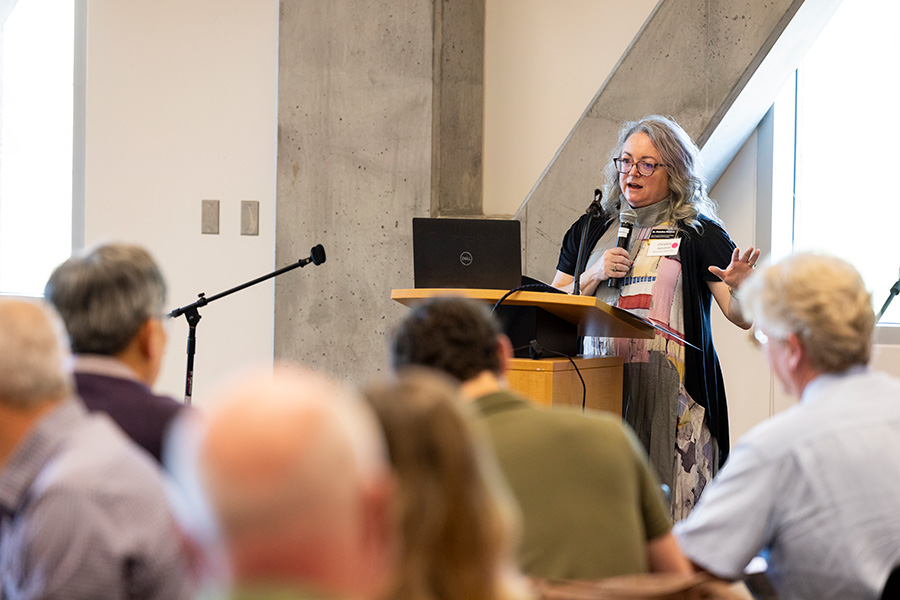
Dr. Christine Hendren, App State’s vice chancellor of research and innovation, leads the Western North Carolina Research for Recovery and Resilience Workshop with a goal of integrating App State research with regional efforts to build a stronger and more resilient Western North Carolina following Hurricane Helene. Photo by Kyla Willoughby
Microgrids for schools
When extreme weather hits, public schools are essential resource centers. Dr. Jamie Russell is spearheading plans for a study on the feasibility of installing microgrids to armor some schools against prolonged power outages — especially because school buildings tend to be places where residents congregate during extreme events and because their closures were so disruptive following Helene.
The miniature grids can isolate themselves during a grid outage and provide continuous power to a facility, explained Russell, who directs the Appalachian Energy Center and is a professor in App State’s Department of Sustainable Technology and the Built Environment.
“Local schools became critical resilience hubs supporting community needs in the aftermath of Helene,” said Russell. “Given the schools’ natural role in resilience and recovery, a multidisciplinary team from App State has begun to explore the details of how microgrid energy systems could support local schools in Western North Carolina and beyond.”
The microgrid concept goes beyond generators to renewable energy sources such as wind and solar, and could integrate electric buses and emergency internet service, Russell said. Schools could also benefit from lower energy bills and outreach from college students working with K–12 students on design and operation of the systems.
Key study tasks include identifying preliminary design options, modeling costs and benefits, analyzing space and solar access, identifying partners and developing the human capacity to plan for, implement and sustain the use of schools with microgrids as resilience hubs during and after weather emergencies. Dr. James Beeler, executive director of College Access Partnerships at App State, co-leads the project. As Russell and Beeler work to refine their proposal, the North Carolina Department of Environmental Quality announced in August an unrelated $5 million investment in up to 24 microgrids to provide an innovative disaster recovery and resilience model for the state.
Well pollution and AI flood mapping
App State researchers are spanning disciplines to delve into storm impacts on well contamination and using AI and community input to create more accurate flood impact models.
Dr. Dennis Guignet, associate professor in the Department of Economics, is concerned that undetected well contaminants may be impacting public health in ways that haven’t yet been quantified. His team is commencing a statistical and geospatial analysis aimed at capturing the scale of the problem.
“Public water systems are regulated under the Safe Drinking Water Act, which requires routine testing and monitoring to ensure that the water is safe. For private wells, however, there are no such requirements,” he said. “This responsibility falls to individual homeowners.”
Dr. William Wang, assistant professor in the Department of Geography and Planning, is launching a three-year effort using AI to enhance flood models that incorporate the High Country’s unique topography, local resilience challenges and social factors to create more actionable data. The improved information stands to assist homeowners, emergency responders and policymakers in creating more accurate assessments and better preparing for future flood events.
Both projects are funded by App State’s Chancellor’s Innovation Scholarship Program. Read more about these initiatives.
Special health needs in the spotlight
Responding to Helene, the Appalachian Public Health Innovation Lab, led by Jennifer Schroeder Tyson '07, research assistant professor in the Department of Public Health, has launched the Appalachian Innovative Approaches 2.0 (APP IA 2.0) Initiative to strengthen systems of care and increase emergency preparedness for families with children and youth with special health care needs.
“Hurricane Helene has put a spotlight on the topic of emergency preparedness, especially for these families,” Schroeder Tyson said. “The APP-PHI Lab, in collaboration with the Appalachian Institute for Health and Wellness, has been able to leverage the attention on this subject to quickly implement several long-term projects to support youth with special health care needs in the High Country.”
Funding from United Way has supported the purchase of emergency and resilience equipment for families, and planned efforts include workshops and new community health hubs addressing emergency preparedness. Researchers with the health innovation lab are analyzing data collected from families following the hurricane to better understand gaps and opportunities in preparedness, response and recovery.
Planning challenges after disasters
The aftermath of Helene showed how much work remains to improve development planning processes in vulnerable areas of Appalachia. Dr. Christine Quattro, assistant professor in the Department of Geography and Planning, has focused their scholarship and teaching around planning challenges involved in long-term recovery. Their research examines how buildings’ proximity to steep slopes and waterways intensified damage from erosion and water, leading to issues that included foundation failures, compromised well and septic access, and mold growth.
“Combined with a shortage of skilled tradespeople and administrative bottlenecks, this has made rebuilding efforts both slow and costly,” Quattro said. “Many of the most affected structures were nonconforming, predating current building codes or now falling within newly designated floodplains — which further complicates recovery due to heightened regulatory requirements and infrastructure limitations.”
The research is supported by the Watauga Housing Council and Watauga Long Term Recovery Group. Quattro is collecting quantitative data from these and 36 other agencies with funding support from App State’s Research Institute for Environment, Energy and Economics and Dogwood Health Trust.
Quattro’s research continues with a fall 2025 studio course in partnership with the High Country Council of Governments, where students gain hands-on experience investigating the challenges of post-disaster housing reconstruction in high-risk settings. Quattro will present at the October 2025 national conference of the Association of Collegiate Schools of Planning to share lessons that hold significance for mountainous regions beyond Appalachia with similar issues and hazards.
“These insights are particularly critical as recovery remains slow due to compounding issues like labor shortages, permitting delays and complex funding pathways,” Quattro said. “All of these must be addressed to rebuild a safer, more resilient housing stock.”
Mental toll on disaster responders
Dr. Maggie Sugg, along with Schroeder Tyson, is engaged in an ongoing assessment of mental health among disaster volunteers. Sugg is associate professor and honors program director in the Department of Geography and Planning. Funded with $50,000 from the Natural Hazards Center, the research examines the emotional impact of the hurricane on community responders.
“Key preliminary findings from a cohort of 411 volunteers reveal a paradox,” said Sophie Ryan '23, a climate and health research fellow with App State’s Department of Geography and Planning, who is leading the research. "While 70% of volunteers reported using volunteering as a positive coping mechanism, those engaged in aid distribution showed significantly higher rates of poor sleep and mental health concerns. The study finds that 50% of volunteers experienced anxiety, and 45% reported feelings of hopelessness.”
Research for health solutions
Building on her earlier research into extreme weather in South Carolina, coastal North Carolina and gulf states, Sugg and her team are harnessing collective decades of experience to make sense of storm impacts, health disparities, mental health repercussions and infrastructure vulnerabilities related to Helene — with an eye to local solutions.
The co-recipient of a $500,000 grant from the National Science Foundation, Sugg is launching the Appalachia Flood-Health Resilience Research Coordination Network.
The initiative will spend the next five years addressing a multitude of risks and associated opportunities and fill gaps in knowledge about flooding impacts on rural communities situated in high-risk mountain terrain.
“Rural Appalachian communities already face higher poverty, limited health care access and aging infrastructure — when floods hit, these vulnerabilities compound,” Sugg said. “Low-income communities face both the highest flood risks and worst health impacts. This network breaks down disciplinary silos to develop place-based solutions for these underserved mountain communities.”
Learn more about the Appalachia Flood-Health Resilience Research Coordination Network.
Dr. Adam Hege, associate dean for research and graduate education and associate professor in the Department of Public Health, is spearheading the launch of a community health needs assessment aimed at the long-standing disadvantage of rural and isolated communities both in health disparities and in getting access to care, with a focus on mental health, substance use, and housing and food security. The work involves collaboration with research teams from App State, Western Carolina University, WNC Health Network, UNC Asheville and East Tennessee State University, which make up the WNC Health Policy Research Consortium.
“The cascading impacts of Hurricane Helene are of particular concern, yet little data exists to understand the health impacts of the hurricane,” Hege said. “The goal of this project is to collect primary data, which can be integrated with existing datasets to identify and understand short-term, ongoing and prolonged community needs in the recovery and response to Helene and to inform policy solutions.”
Integrating storm impact and hospital data from multiple sources, the research will survey community members involved in response and recovery, along with volunteers, public health leaders, town, county and regional administrators, state policymakers, educators and clinicians, with a goal of understanding their experiences during and after the hurricane.
The project leverages funds from Dogwood Health Trust as the researchers pursue other federal and foundation funding. Sugg and Sophie Ryan '23, a climate and health research fellow with App State’s Department of Geography and Planning, are co-principal investigators on the project.
Barriers to disaster aid
Sugg is teamed up with geography graduate student Caleb Blackburn ’21, of Boone, on a study documenting differences in federal disaster assistance between urban and rural areas. Their research shows urban areas received assistance at nearly double the rate of rural ones, which had 11% higher damage per capita. Once rural residents navigated the application process, assistance amounts were equitable — indicating systemic access barriers rather than discriminatory allocation, Sugg said.
The research is currently under review at the international journal Environmental Hazards.
“Our primary long-term goals include developing evidence-based policy recommendations for restructuring FEMA assistance frameworks to address rural access barriers, creating predictive models for health outcomes based on disaster exposure and preexisting vulnerabilities, and designing community-driven mental health support systems,” Sugg said.
Across multiple Helene-related initiatives, Sugg and her team intend to involve more than 10 App State student researchers, produce six to 10 peer-reviewed publications and host annual collaborative sessions.
While it is still early for solid outcomes, Sugg noted the research is pointing to several patterns: Infrastructure had a strong influence on human health post-Helene, with higher road closure ratios equating to disproportionately less aid — directly impacting health outcomes in isolated areas. Preliminary analyses of trends in emergency department visitation corroborate on-the-ground data, with higher visits observed for post-traumatic stress, substance use, anxiety and suicide-related outcomes in communities heavily impacted by Helene.
“Then there is the ‘volunteering paradox,’” Ryan said. “While community support networks proved crucial, the act of helping others may have come at a psychological cost to volunteers.”
Impacts across the terrestrial food web
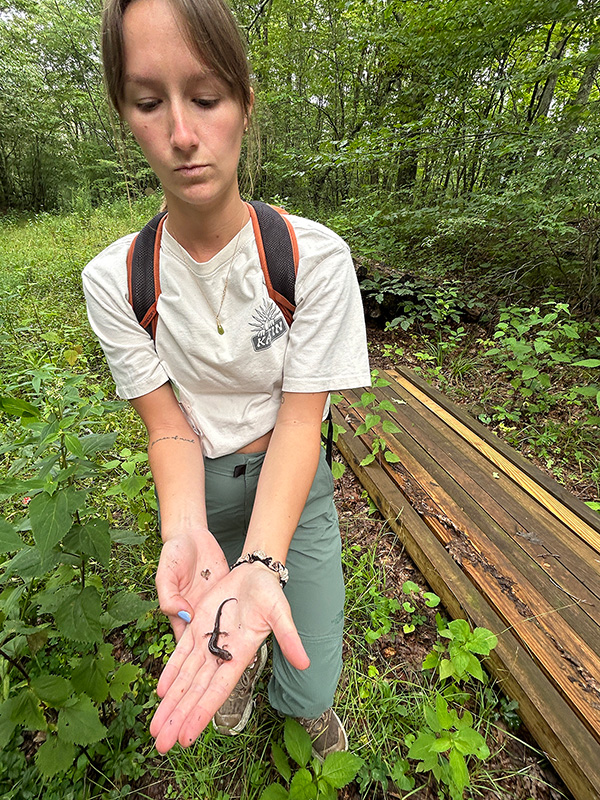
App State wildlife technician Alisha Herndon shows a salamander found in Elk Knob State Park, part of a network of survey sites where App State research led by associate biology professor Dr. Jon Davenport is assessing the impact of Hurricane Helene on salamander populations and the food web generally. Photo by Bret Yager
There are 27 species of salamanders in Watauga County alone, and 67 statewide — and their population density is up to 10 times greater than that of deer. Sensitive to pollution, habitat disruption and changes in rainfall, the creatures are key indicators of ecological health. That’s why Dr. Jon Davenport, associate professor in the Department of Biology, and his team of 10 App State student researchers have placed salamanders at the center of their work to better understand how the food web as a whole was impacted by Hurricane Helene.
Davenport has surveys at 58 sites in Northwestern North Carolina and Northeastern Tennessee. His team is analyzing data across a range of months on both sides of the hurricane to compare the abundance of salamanders and the invertebrates that make up their food source.
“Our focus is how food webs change through time, in response to big events, and how that reverberates through the food web,” he said.
The survey sites range from 2,200 to 6,600 feet in elevation in a variety of forest habitats, many of them heavily impacted by landslides and windfallen trees. Funded with $200,000 from the National Science Foundation, Davenport and his team have surveyed the ground in 25-meter transects during day and night conditions — setting up trail cameras, identifying, weighing and then releasing the salamanders, gathering the invertebrates they feed on, and taking soil, climate and other measurements. Data from the surveys and camera traps may help show disruptions or shifts in food sources, salamander populations and predator numbers.
Davenport’s team still needs to crunch a lot of data, and their observations are preliminary but encouraging. Chief impacts seem to have been blowndown trees and landslides in some heavily affected areas, but as a whole, salamanders and the food web appear to be faring well.
“I’ve been amazed,” Davenport said. “The numbers, anecdotally, are the same across recent years. There has been no obvious change in diversity. Salamanders are resilient. They’re so metabolically efficient that they can go underground for a year if they need to.”
The research is supported by the Grandfather Mountain Stewardship Foundation, Grandfather Mountain State Park, Elk Knob State Park, Doe Mountain Recreation Area, Blue Ridge Conservancy, New River State Park and Mount Jefferson State Natural Area, North Carolina Wildlife Resources Commission, Tennessee Wildlife Resources Agency, Mount Mitchell State Park and Blue Ridge Parkway.
Battered but tenacious, hellbenders hang on
Swimming, crawling and diving in waters crucial to the survival of one of Appalachia’s most elusive and revered inhabitants, biology graduate student Hutch Whitman and his team of App State students and volunteers combed through mud and murk, intent on locating just one thing: eastern hellbenders.
Concerned that floods from Hurricane Helene may have devastated fragile populations of North America’s largest aquatic salamander, the team surveyed 30 sites in the New, Watauga and Nolichucky rivers this summer.
Whitman, of Raleigh, is pursuing a master’s degree in biology with a focus on freshwater conservation. Working in the laboratory of App State biology professor Dr. Michael Gangloff, Whitman is comparing more than a decade’s worth of data gathered from the three river basins, hoping to identify changes in habitat and hellbender populations and understand how those shifts interrelate — especially with extreme weather thrown in the mix.
Returning to the rivers to conduct surveys in the wake of Helene, his team found a world transformed.
“The habitat had completely changed,” Whitman recalled. “All these big boulders the hellbenders nest under and live most of their lives — were gone. Places where we had seen nests and clusters of 10 to 15 animals were totally barren.”
Initially, the outlook for hellbenders seemed grim. When waterways overran their banks, they not only transformed habitats, they swept hellbenders away.
“People were finding hellbenders in the middle of the road, crippled up in masses of debris. People were finding them in their basements and fields,” Whitman said. “It was potentially a level of population decrease we really haven’t been able to document before on such a massive scale.”
This summer, a group of App State faculty, staff and students set out to study North America's largest salamander, the hellbender — work that reveals how the High Country's rivers and streams fared after the effects of Hurricane Helene. Watch the video
Overall, preliminary data gathered from many sites points to a decline in hellbender numbers. Most of the hotspots that held large populations have taken a significant hit — especially in the Watauga River. The most populous site last year, with 22 animals, had only eight in the post-Helene surveys.
But, as Whitman noted, “Everyone’s fear was that they were totally gone. They’re not — which is great. These animals have lived here for thousands of years. They’ve seen monumental floods, and they’ve persisted. So we’re trying to analyze what factors in these different locations allow hellbenders to persist in some areas and not others.”
Whitman noted that the efforts of community volunteers and partnerships with local programs, such as the Watauga Riverkeeper program, are key sources of support for the surveys.
The largest hellbender surveyed by the team so far has been around 2 feet long. Despite their size, identifying and securing these slithering animals in murky water can be daunting — and grueling.
“Since they blend in so well, it’s hard to differentiate them from a rock,” said lab technician and team co-lead Emily Gillikin ’24, of Virginia Beach, who majored in ecology, evolution and environmental biology at App State. “It takes some practice. But I will never forget my first time spotting — let alone capturing — one.”
These secretive denizens of High Country streams are key indicators of water quality. Being skin-breathers, they cannot thrive in areas with low dissolved oxygen or heavy siltation. They need large boulders for nesting and plenty of shady cover. That’s why the team is gathering two sets of data at each site — one quantifying hellbender populations and the other characterizing the corresponding habitat.
Gillikin said that more work needs to be done with the data, but she’s observed that hellbenders seemed to have fared better where there was strong riparian cover — a living network of vegetation and roots to hold soil in place, filter silt and provide shade.
The findings could help inform future management of the hellbender, which the U.S. Fish and Wildlife Service proposed for listing as endangered across its entire range in 2024 due to degraded water quality, habitat destruction, disease and other factors.
“There’s a push toward captive breeding of hellbenders right now, but everyone is trying to piece together the best methods for how and where to reintroduce them,” Whitman said. “So if we can understand the features in the streams and riparian areas that help boost populations — even if massive storms hit — that’ll be beneficial for trying to jump-start new populations.”
What do you think?
Share your feedback on this story.
About the Office of Research and Innovation
Appalachian State University’s Office of Research and Innovation supports the scholarly and creative activities of App State faculty, staff and students by expanding access to and facilitating the management of research opportunities. The office consists of four units: Grants Resources and Services, Sponsored Programs, Research Design and Analysis, and Research Protections. The office also collaborates with the university’s Special Funds Accounting on the fiscal management of awarded projects. Learn more at https://research.appstate.edu.
About Appalachian State University
As a premier public institution, Appalachian State University prepares students to lead purposeful lives. App State is one of 17 campuses in the University of North Carolina System, with a national reputation for innovative teaching and opening access to a high-quality, cost-effective education. The university enrolls more than 21,000 students, has a low student-to-faculty ratio and offers more than 150 undergraduate and 80 graduate majors at its Boone and Hickory campuses and through App State Online. Learn more at https://www.appstate.edu.




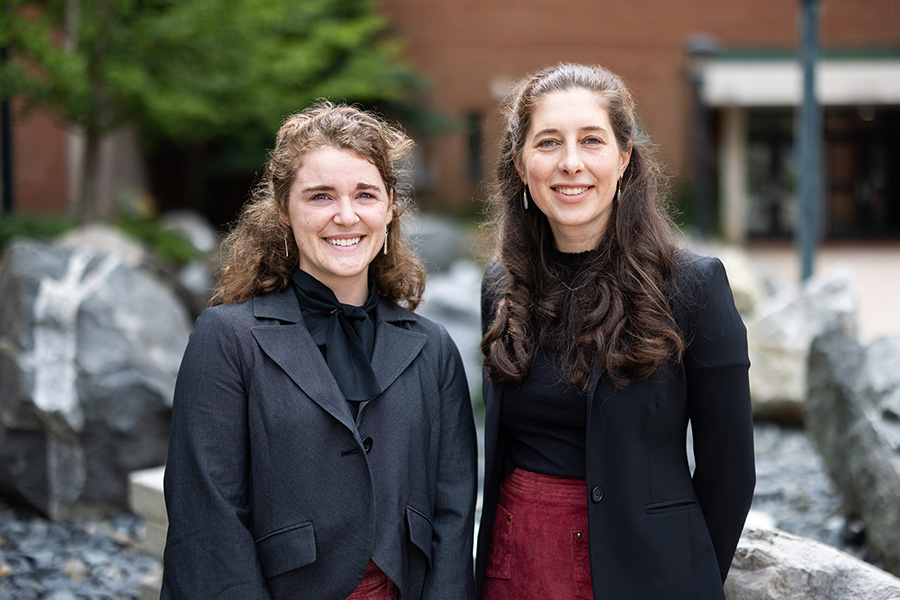
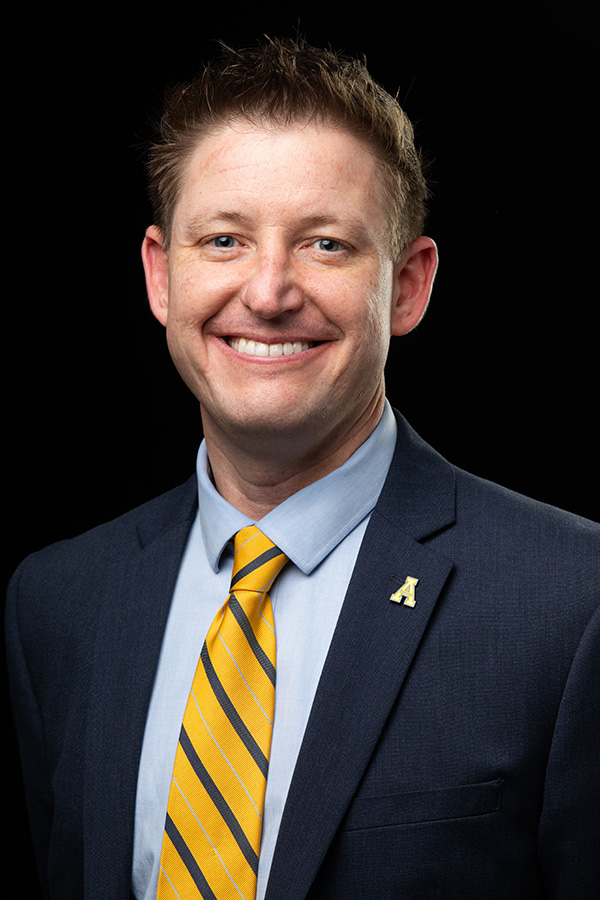

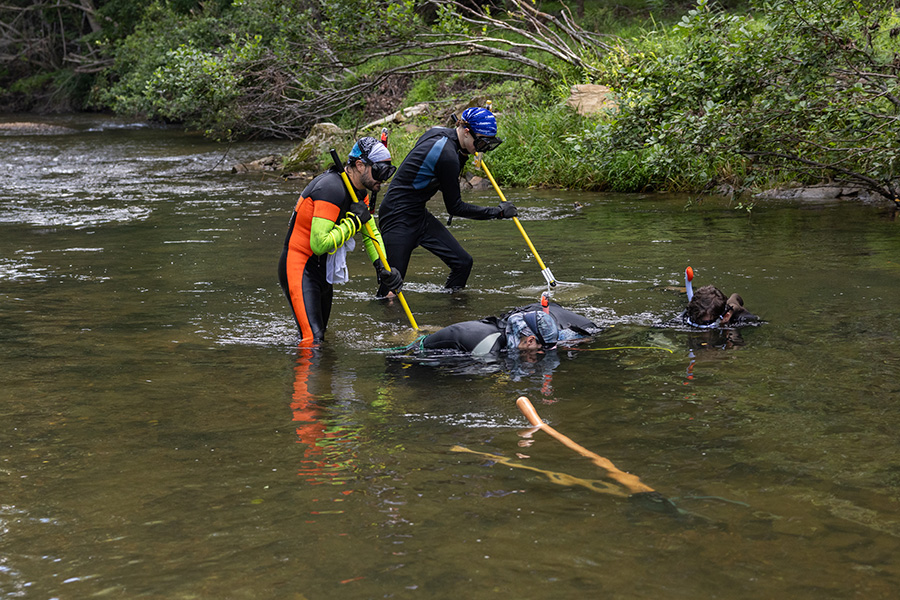
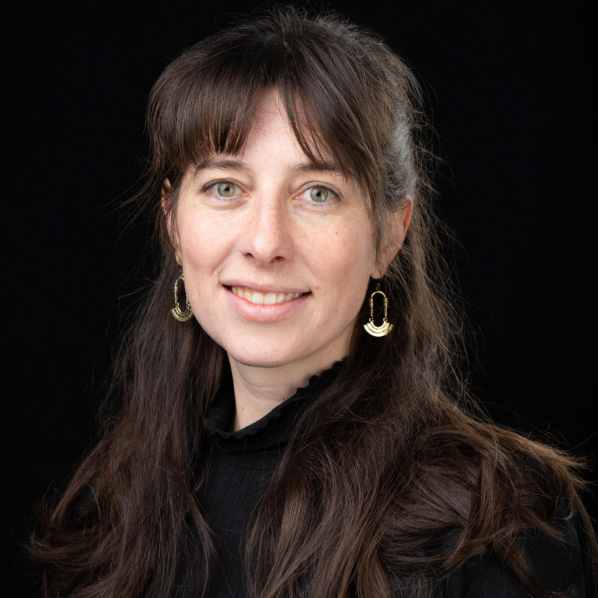
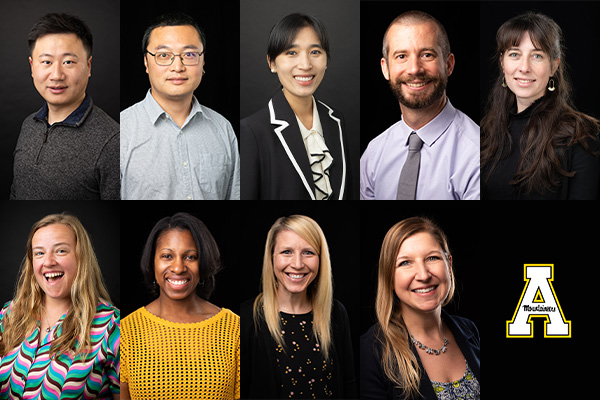




![How NCInnovation Is Rethinking Economic Development in North Carolina [faculty featured]](/_images/_posts/2026/02/rethinking-economic-development-600x400.jpg)







